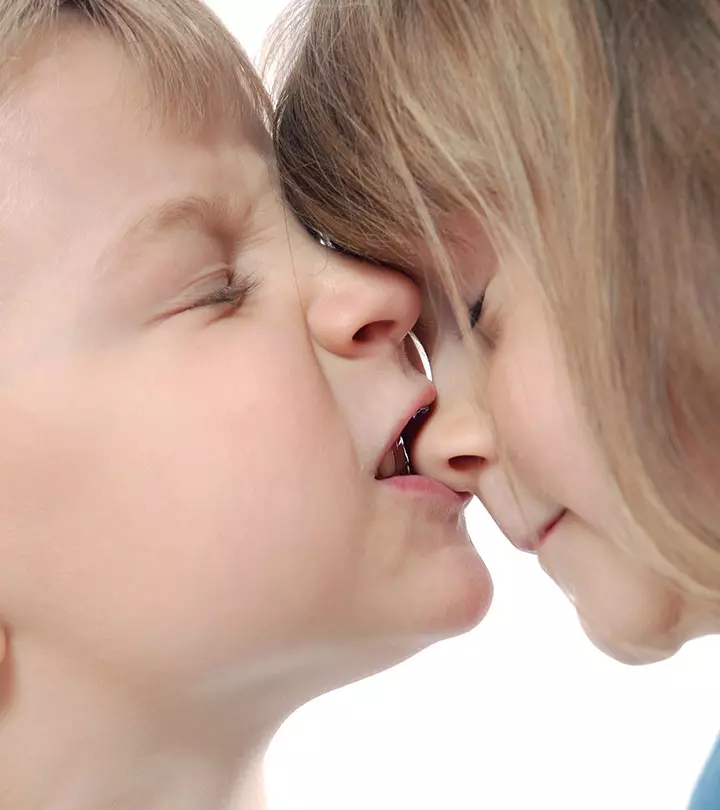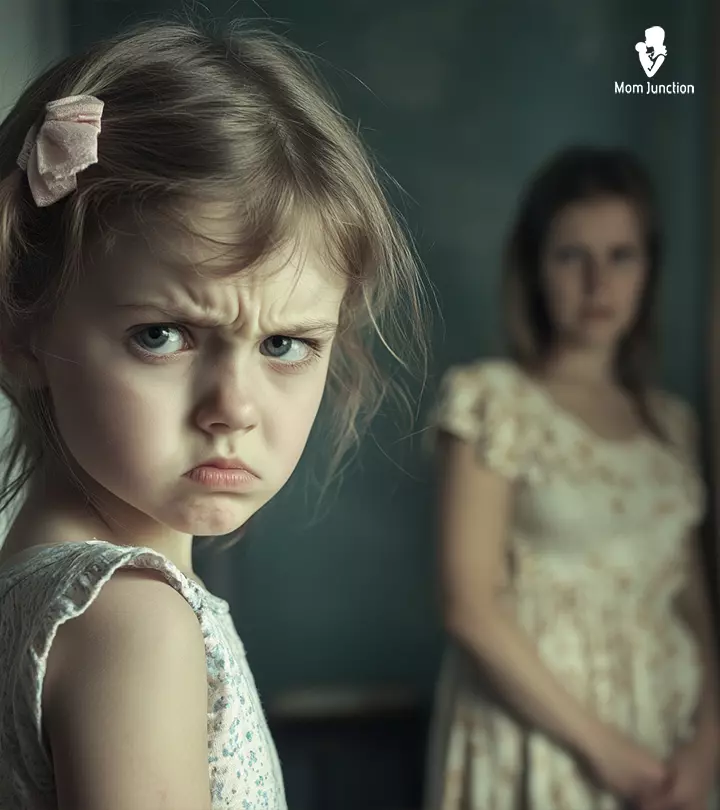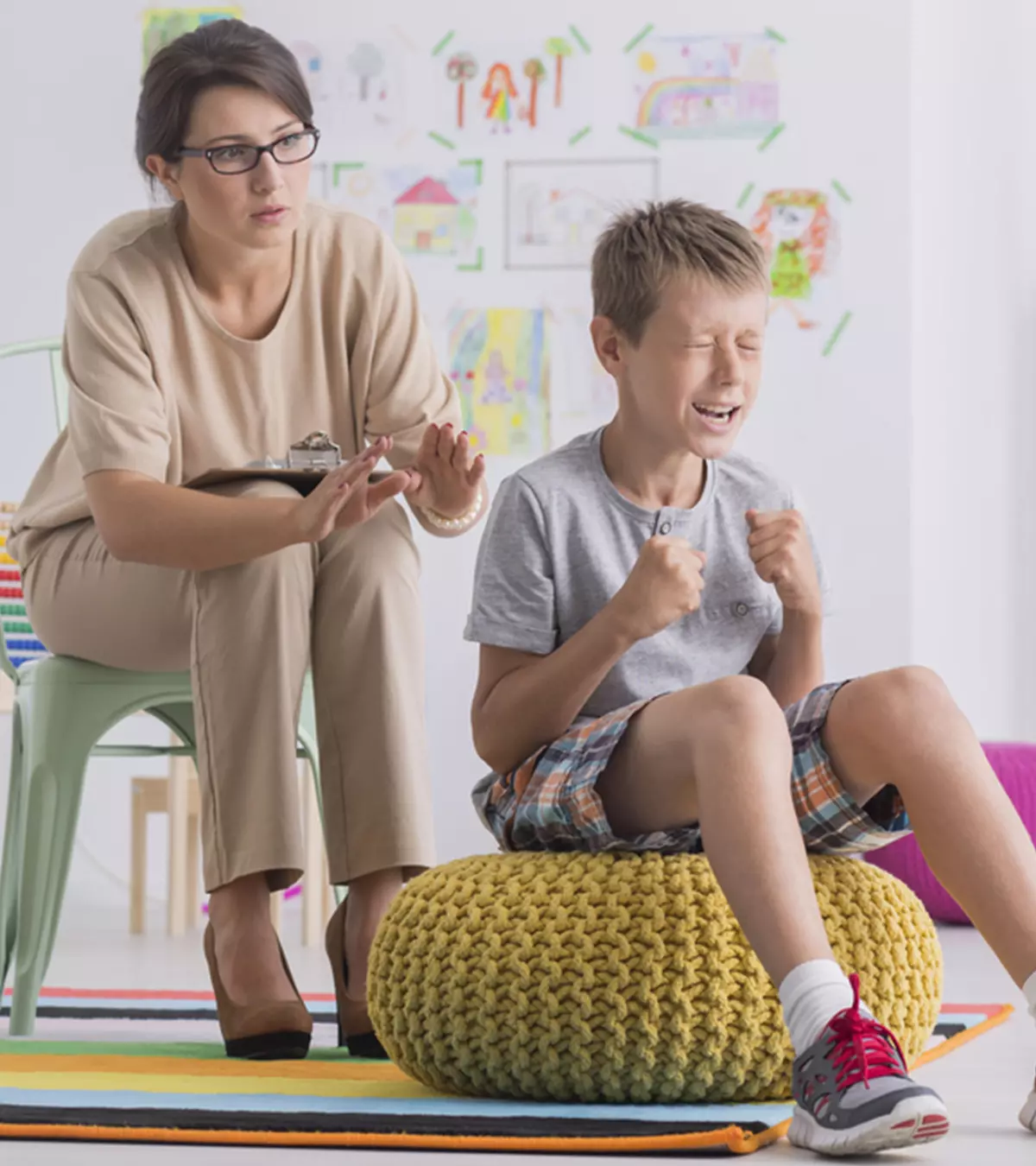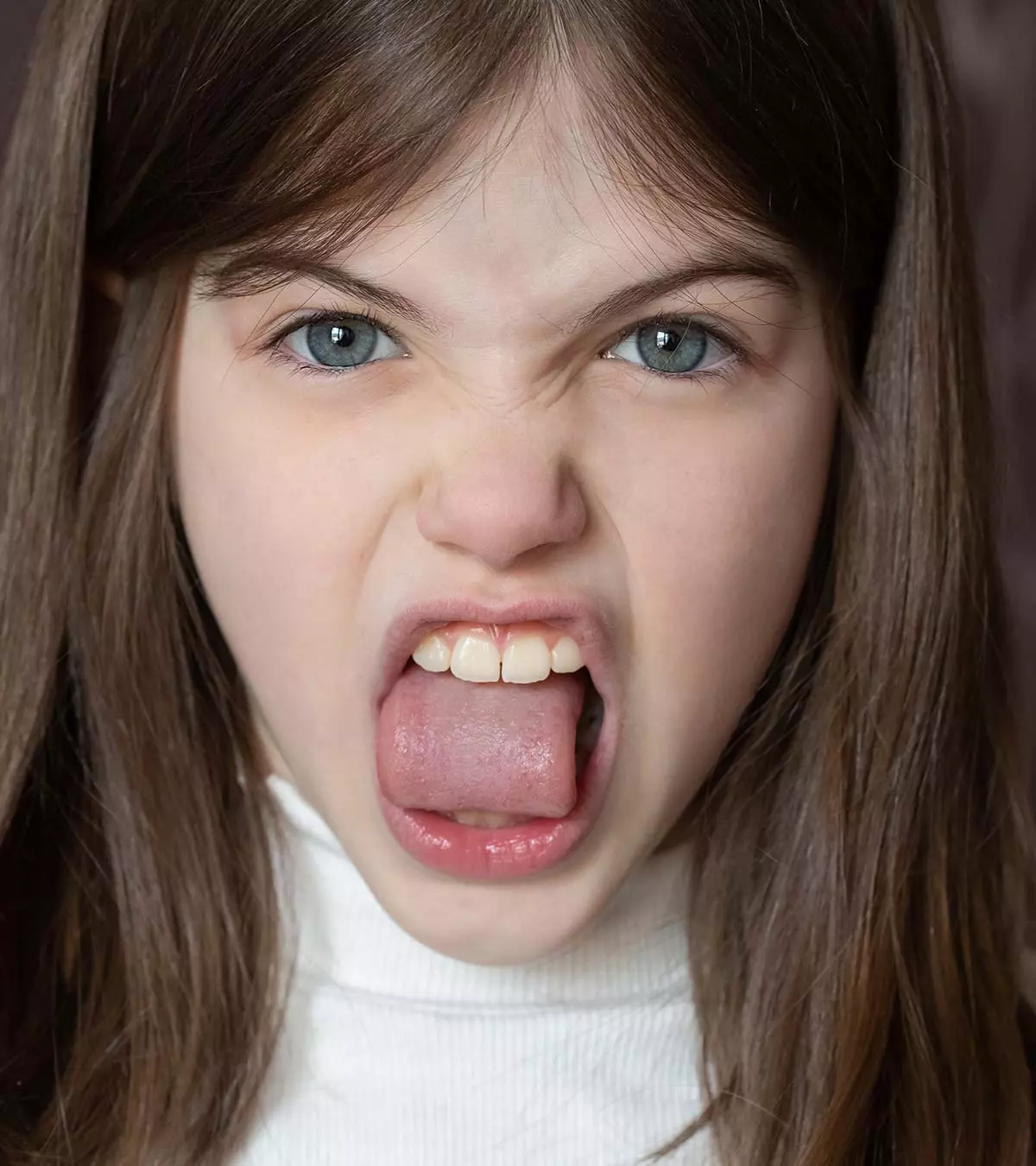
Image: Shutterstock
Many parents do everything in their power to instill societal conventions in their children. They even buy books about moral principles and show them movies on life lessons. Yet, despite their efforts, they may struggle with dealing with a disrespectful child.

Various factors may cause children to act out and behave disrespectfully. You may even wonder if it is possible to help a growing child change their behavior. Continue reading to learn about the various causes of such disrespectful behavior and discipline strategies to deal with a disrespectful child.
Key Pointers
- Your child’s disrespectful behavior could be due to bad influence, substance abuse, or mental health issues.
- Their behavior could have an effect outside the home too, and you may have to listen to complaints. It may also make it difficult for them to make friends.
- Some ways to deal with a disrespectful child are setting boundaries, imparting good values, adjusting your parenting style, and pointing out their bad behavior in time.
Possible Reasons Behind Your Child’s Disrespectful Behavior
Identifying the root cause of a problem is the first step in managing a child’s behavior. Read this section as we tell you a few plausible reasons behind your grown child’s disrespectful behavior.
1. Your actions
Sometimes, parents may do things that aren’t fair to children. It may be an unintentional bout of anger or lack of support. Although you might have forgotten such incidents, your child might still remember them as they’ve been deeply affected by them. These unidentified situations may lead to disrespectful behavior in kids.
2. Substance abuse

Substance abuse is in itself a result of multiple contributing factors. In 2025, a study found that substance use was prevalent among high school students in the US. Roughly 30% of students reported engaging in current use of alcohol, marijuana, or prescription opioid misuse (10). Addiction to alcohol or drugs could be due to low self-esteem, past traumas, stress, frustration, or poor academic performance (1). Your interrogation on such habits could bring out your child’s wild side.
3. Mental health issue
An underlying mental health issue could be one of the reasons why your child disrespects you. They could be under stress due to the new turns in their life. Anxiety and depression could also be contributing factors. In US children aged 3–17 years, the Centers for Disease Control and Prevention found that 9.4% suffer from anxiety, and 20.9% have previously encountered a major depressive episode.
4. History of abuse
Children learn by observing their parents and siblings. If you tend to get angry or show disrespect to people in unfamiliar or uncomfortable situations, chances are your child would learn to deal with them the same way. The Michigan State University states that this ‘‘observational learning” is not only confined to people with whom a child directly interacts but also includes the influences of media, television, or other people around them outside the home (2).
5. Bad influences
Your child could have made new friends who are a bad influence on them. If these new friends disrespect authority figures and rules, your child could pick up the same traits.
Consequences Of Disrespect

If your child disrespects you or the people around them, it is a wake-up call for you to change your parenting style as such bad behavior has consequences.
- The disrespect may extend beyond the house and cause problems to people who come into contact with the child.
- You may hear complaints from the school or college regarding their bad behavior with fellow mates.
- The child may also fail to make good friends.
 Be watchful
Be watchful16 Ways To Deal With A Disrespectful Child
Here are a few effective ways to deal with a disrespectful child and help them change their bad behavior.
1. Set healthy boundaries
Disagreements are inevitable between a grown child and a parent. However, establishing healthy boundaries agreed upon mutually could create a respectful environment for you and your child. Here are a few tips for setting healthy boundaries:
- Have a family meeting and involve your child in the discussion while setting up boundaries.
- Assure your child that you trust them to follow the rules.
- Do not set many boundaries at once.
- Be articulate about the rules.
- Appreciate when boundaries are respected.
2. Do not always be their savior
As a parent, you might have done everything possible to teach them good values. However, there will come a time when you’ll have to let them figure out the rest by themselves. Neglecting this fact can lead to an overprotective and over-involved parenting style and suffocate your child.
Give them space and independence and realize that they’re an individual with their own dreams and aspirations. Try lending a helping hand only when needed and avoid meddling.
3. Adjust your parenting style
Find out what your parenting style is. Is it authoritative, permissive, or uninvolved? Parenting styles affect children right from the way they feel to the way they react.
The authoritative parenting style is known to benefit children. It focuses on creating a positive relationship with the children while considering their feelings. Children brought up under this parenting style, wherein the parents interfere only when required, tend to be less disrespectful.
4. Call out disrespectful behavior
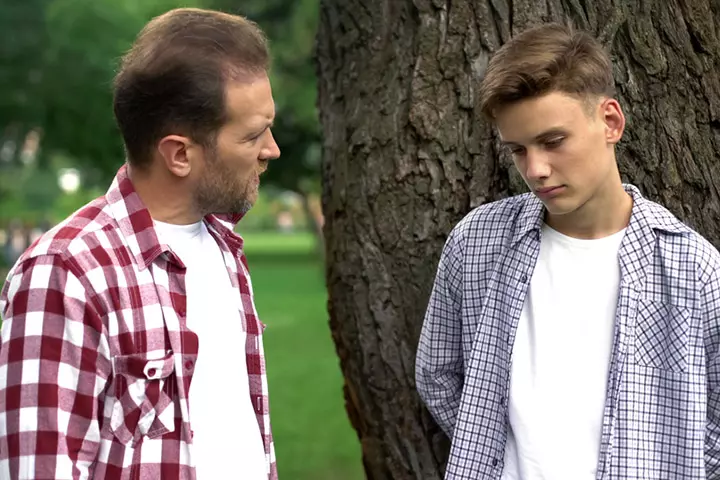
Do not hold back when your child disrespects you or anyone. The more you ignore such bad behavior, the more likely they’re to think that it is okay to disrespect others. Call out disrespectful behavior, and let them know the consequences of such actions.
5. Discuss alternatives
When your child shows disrespectful behavior, sit down and discuss the alternative ways the situation could have been handled. Maybe your child doesn’t know that there could be calmer ways to deal with such situations. Even UNICEF advises parents to behave pleasantly around children so that they start looking at things from an optimistic perspective. Establishing the consequences calmly when the child refuses to listen while praising good behavior creates a positive feedback loop (3).
6. Involve your partner
Discuss with your partner and know if they’re on the same page as you about your child’s behavior. Try not to have contrasting opinions while discussing the issue with your child, as this could reduce the chances of success. Always consult with your partner and keep each other updated on any private conversations that happen with the child.
7. Speak in a respectful manner
Remember that shouting would not mend things. If your child retorts and shows disrespect, it could be because they do not know how to behave. If you talk to them in a similar tone, it can only make matters worse. Children not only learn from what you are telling them but also your body language, style of communication, and how you handle your temper.
Ask them if they want to chat with you about their behavior. Give them time to explain, and let them know you respect them. Be a good listener, and don’t be judgmental. Instead, acknowledge their points, empathize with them, and maintain a calm, respectful tone throughout the conversation. Following these steps may aid in effective child behavior management.
8. Take it one step at a time
Even the smallest of actions geared towards correcting a bad behavior counts. If your child puts in the effort, acknowledge them and give them a fair amount of time to change. Be persistent with your actions, and do not have unrealistic expectations. Let them move on with the process at their own pace.
9. Empathize without enabling

Sometimes, you may think you’re helping your child with a problem, but you may be doing more harm than good by making them more dependent. This constant help they receive from you could stifle their growth.
So the next time you see your child facing a problem, empathize with them rather than provide a solution. Observe how they learn from the crisis and grow stronger by themselves. This would not only make them respect you more for the support but also respect themselves.
10. React less and create more
Do not react to your child’s disrespectful behavior aggressively. Your anger could only make them more stressed and lower their self-esteem.
Create opportunities for improvement, and observe your child’s body language for a few days. You could present them with ways they can act and let them learn by observing you.
11. Validate their feelings
You should realize that your child is a unique individual with their point of view. Listen to their perspective and validate their feelings. React in an affirmative tone. Try to understand why they feel a particular way. Teach them how to identify and process their emotions instead of lashing out and showing disrespectful behavior. Show them how to express their feelings through words and actions, like journaling or art, or simply through an honest conversation.
12. Acknowledge your mistake
If you’ve made a mistake, and you know about it, do not hesitate to apologize. Your child could get inspired by you and realize that there’s nothing shameful in apologizing. They may even try to admit their mistakes of the past on seeing your honesty.
13. Do not dwell in the past
Do not focus on something that has happened in the past; learn from it and move on. Find out what your child is feeling at the moment. Ask them if they need any help and if they want you to play a role in their improvement. Don’t keep bringing up past mistakes in unrelated conversation. It takes away from the importance of the issue at hand and also makes the child feel that his or her mistakes are never going to be forgiven entirely.
14. Teach them interactive skills
Hold a few practice sessions at home and enact different scenarios. Discuss every time they go wrong and help them see the alternative actions that could take place.
15. Schedule discussions
If it seems like your child is bothered by something, schedule a private meeting. Let it be their venting-out session. If your child is not comfortable around you, assist them in venting out around someone they’re comfortable with. Do not hesitate to schedule an appointment with a family counselor if they’re ready to meet one.
16. Applaud good behavior
Encourage good behavior and applaud their good deeds. Notice any changes in their behavior and praise them when they do something right or react to a difficult situation calmly. Positive communication goes a long way in promoting desirable behavior in the future. The American Academy of Pediatrics emphasizes appreciating good behavior as children need to know when they do something good as well (4).
 Quick tip
Quick tipInfographic: Reasons And Ways To Help A Disrespectful Child
A disrespectful child doesn’t mean they are self-centered or lack manners. Take a glance at this infographic to know the causes behind their behavior and how you can discipline them.
Some thing wrong with infographic shortcode. please verify shortcode syntax
Frequently Asked Questions
1. What are the signs of a disrespectful child?
If your child constantly resorts to physical violence with peers, disobeys, argues, and doesn’t properly respond to you, these could indicate that they have disrespectful behaviors (5). They could be using physical aggression or verbal abuse against you, your partner, their siblings, and their peers instead of learning how to process their feelings, all of which are signs of disrespectful behavior.
2. What are examples of disrespect?
Rude behaviors such as slamming doors, yelling, bullying, using swear words, and inappropriate gestures are some examples of displaying disrespect towards others (6).
3. What is the difference between discipline and punishment for a disrespectful child?
Discipline is discouraging bad behavior by teaching children about the possible consequences of their actions and allowing them to correct their behavior. On the other hand, punishment is a form of negative discipline that is aimed at getting rid of bad behavior without teaching them the right ways to deal with a situation. Furthermore, discipline promotes long-term positive effects such as healthy behavior and open communication. In contrast, punishment may simply deescalate the situation temporarily, and the child may end up resenting the punisher (9).
Dealing with a disobedient child can be one of the hardest parenting challenges. Help your child understand the consequences of being disobedient. As children tend to learn from parents, check your parenting style. While dealing with such children, understand that consistency is the key. You may hit a few setbacks in the process but remain patient. Be observant of your child’s behaviors and applaud any good deeds to encourage a positive change. If it may help, consult a health professional to identify the cause and opt for the right intervention strategy.
Illustration: Effective Ways To Deal With A Disrespectful Child
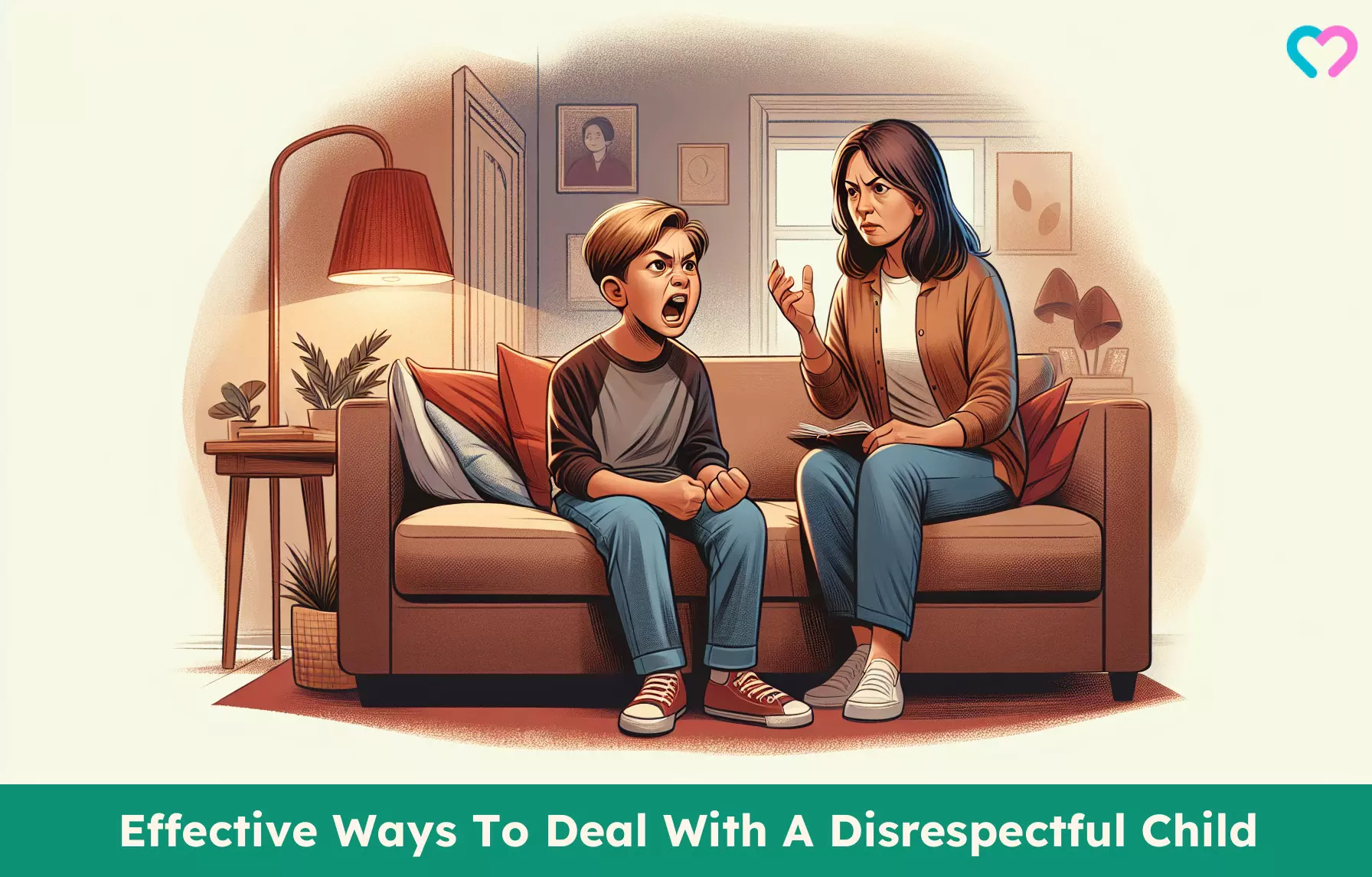
Image: Stable Diffusion/MomJunction Design Team
Dealing with your teen’s disrespectful behavior is a challenge explored in this insightful video. Discover key strategies for effective communication and managing episodes of disrespect.
References
- Chapter 2 Impact of Substance Abuse on Families; National Center for Biotechnology Information
https://www.ncbi.nlm.nih.gov/books/NBK64258/ - Monkey see monkey do: Model behavior in early childhood; Michigan State University
https://www.canr.msu.edu/news/monkey_see_monkey_do_model_behavior_in_early_childhood#:~:text=Children%20learn%20and%20imitate%20behaviors%20by%20watching%20and%20listening%20to%20others.&text=This%20is%20sometimes%20called - How to discipline your child the smart and healthy way. UNICEF
https://www.unicef.org/parenting/child-care/how-discipline-your-child-smart-and-healthy-way - What’s the Best Way to Discipline My Child?; American Academy of Pediatrics
https://www.healthychildren.org/English/family-life/family-dynamics/communication-discipline/Pages/Disciplining-Your-Child.aspx - Disrespectful behaviour in pre-teens and teenagers; Raising Children Network
https://raisingchildren.net.au/pre-teens/behaviour/behaviour-questions-issues/disrespectful-behaviour - Examples of Disrespectful Behavior; University of Iowa
https://conflictmanagement.org.uiowa.edu/sites/conflictmanagement.org.uiowa.edu/files/2025-03/Respect%20Continuum.pdf - Battling Rudeness in Kids: The Causes and Consequences
https://www.parenting.org/article/Pages/battling-rudeness-part-1-the-causes-and-consequences-in-kids.aspx - Battling Rudeness Part 2: Helping Your Child Learn Positive People Skills
https://www.parenting.org/article/Pages/battling-rudeness-part-2-helping-your-child-learn-positive-people-skills.aspx - The difference between discipline and punishment.
https://www.understood.org/en/articles/the-difference-between-discipline-and-punishment - Alcohol and Other Substance Use Before and During the COVID-19 Pandemic Among High School Students — Youth Risk Behavior Survey United States 2025
https://pmc.ncbi.nlm.nih.gov/articles/PMC10156154/
Community Experiences
Join the conversation and become a part of our nurturing community! Share your stories, experiences, and insights to connect with fellow parents.
Read full bio of Dr. Neha Bhave Salankar
Read full bio of Bhavana Navuluri
Read full bio of Dr. Ritika Shah
Read full bio of Apoorva K





